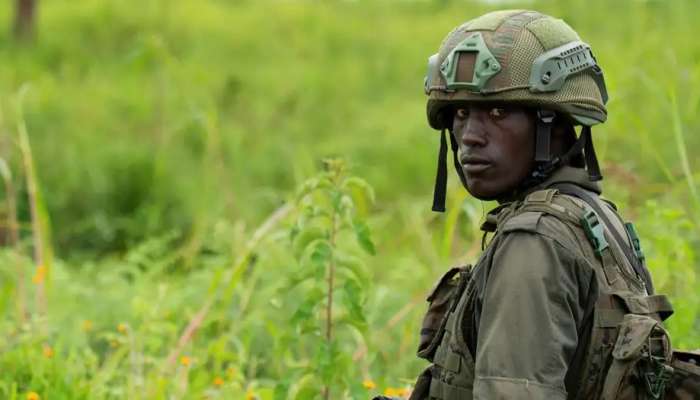
Goma: Recent fighting near the city of Goma in the eastern Congo has alarmed the United Nations Security Council (UNSC), which said on Monday that it was worried by the "escalating violence" in the region. The council condemned the offensive launched earlier this month by M23 rebels.
Also on Monday, South Africa's President Cyril Ramaphosa announced that his country was deploying 2,900 troops as part of a joint effort of the Southern African Development Community (SADC) to quell the fighting in the Congo. SADC forces are already combating alongside the Congolese army.
Confrontations between M23 and government forces are concentrated around the town of Sake. With its roughly 50,000 inhabitants, Sake, situated just west of Goma, the capital of North Kivu province, is seen as a strategic position. It is only a twenty-minute drive away from Goma, analyst Onesphore Sematumba from the think tank Crisis Group told DW.
"Before this, there were already three big refugee camps around Goma. Now it is all of Sake plus the agglomerations that lie beyond — whose inhabitants had fled to Sake before — advancing toward Goma," Sematumba said.
"I came to Goma where I don't know anyone," said Benoit Safari, one of many refugees who made the roughly 20-kilometer (12.4 miles) trip from Sake. "I don't know where to spend the night, nor where to find something to eat," he told DW upon arrival last Wednesday.
The city, which is already struggling to feed its one million inhabitants and refugees from the north, is under mounting pressure to provide for the hundreds of internally displaced arriving every day, aid organisations say. People told DW that Goma had become an open-air prison, with all land routes leading out blocked by rebels. This has sent prices for basic goods skyrocketing.
Goma's western outskirts have been struck by bombs, purportedly by accident. But it was enough for many to feel the looming threat. Anita Banga from Goma's Mugunga neighborhood told DW: "I am moving out because I suffer from high blood pressure. I couldn't spend another night here."
Sematumba said the arrival of internally displaced persons is causing tensions to rise in the city. Goma's inhabitants are beginning to fear for their safety and looking for a way out he said, adding: "But how can you do that when the only way out of the city leads to Rwanda?"
Rwanda is widely thought to support M23, although the government in Kigali has steadfastly denied the accusation.
Resentment is growing among the population against international organisations like the UN mission to Congo, MONUSCO, seen as at least partially responsible for the situation. A resident of Sake told DW how some people attacked cars of international troops. "When they arrived at the roundabout in Sake, people held them up, saying they were siding with M23. They began throwing stones at the MONUSCO cars."
In Congo's capital of Kinshasa, 2,000 kilometers to the west, fierce protests have been directed not only at MONUSCO headquarters, but also at the embassies of France and the United States, among others.
Early on Tuesday, Congo's Deputy Prime Minister and Minister of the Interior, Peter Kazadi, barred motorcycle taxis and street vendors from entering Gombe. "We make a point of reminding everyone that the grounds of foreign diplomats and MONUSCO personnel are not to be violated," Kazadi said.
Protests flared up after Congo's football team lost to Ivory Coast at the AFCON football championship semi-finals last week. To raise awareness for the violence engulfing their country, Congolese players mimicked pistols pointed at their temples and held their hands before their mouths. The images went viral on social media, stirring controversy.
Sematumba said that blaming forces outside the Congo, be it international players or Congo's eastern neighbor Rwanda, was a common reflex. But he cautioned that the problem was more complex.